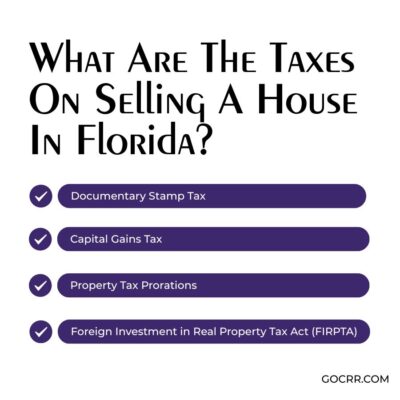
Selling a home in Florida isn’t exactly like selling anywhere else. Between the snowbirds, hurricanes, and trying to keep mold and mildew at bay, we Sunshine State realtors have our work cut out for us! Having closed thousands of deals across Tampa, Miami, and Orlando, we assure you that the Florida real estate market requires some specialized knowledge to master.
The uniqueness of our state climate, demographics, and regulations presents both challenges and opportunities. The time to sell differs considerably by the type of neighborhood you’re in, whether that’s a retirement community in Naples or a family neighborhood in Jacksonville. And your listing price must take many factors into consideration, from flood zones to HOA restrictions.
That’s why today, we are sharing a guide to help you master the art of successfully selling homes in Florida.
Selling A Home in Florida
Over the years, Charles Rutenberg Realty has honed in on the techniques that really work when buying or selling a home in the Florida market. You’re about to get the inside scoop on everything—and we mean everything!
By the time you’re done reading, you’ll know exactly how to navigate those uniquely Floridian disclosure requirements that can make or break a real estate transaction. You’ll also learn techniques to reduce your average time to sell and maximize your home’s sale price.
When Is The Best Time To Sell A Home In Florida?
Selling seasons in Florida aren’t as black and white as they are in some of our northern neighbors’ markets. Spring normally generates the largest volume of home buyers nationally, however, our market dances to a different tune. From our experience at Charles Rutenberg Realty, January to April seems to be our sweet spot. It’s also when you’re likely to get the most competitive offers and shortest days on the market.
But don’t write off summer! Families who are moving want to be settled before the school year begins. So, June and July can be surprisingly busy months for homes with a decent number of bedrooms in family-friendly neighborhoods. Autumn has its own benefits too—less competition from other listings and buyers motivated to close by year-end.
How To Sell A Home In Florida?
Let’s get into how to become the most effective realtor in the Sunshine State:
Get familiar with Florida’s disclosure requirements.
Unlike the standard disclosures you may be used to, our state has specific requirements. Flood history is especially important—given our hurricane history and really high-water tables.
As the listing agent, you want to make sure your clients understand that disclosing known defects is not just the ethical thing to do—it’s the law. So, prepare a robust checklist for your sellers that includes Florida-specific variables like sinkholes, flooding history, mold remediation, and whether the property has polybutylene plumbing (a major no-no with insurers).
Strategically price homes for the Florida market.
Successful real estate professionals in Florida fully understand that accurate pricing from day 1 drives more exposure and ultimately higher sales prices than the “list high, reduce later” approach. We suggest performing an in-depth competitive market analysis that includes:
- Flood zone designation
- Insurance availability and costs
- HOA restrictions and fees
- Recent renovations (especially hurricane hardening features)
- Distance from water features (which influences desirability and insurance)
This data-driven approach also helps break through the emotional connection many home sellers have to their property value.
Learn to leverage Florida’s curb appeal.
Florida curb appeal is more than just a fresh coat of paint. It’s about demonstrating how the property survives our unique climate. When advising sellers on how to ready their home for sale, focus on Florida-specific improvements home buyers want.
So, encourage your customers to highlight:
- Hurricane protection features
- Energy-efficient cooling systems (our electric bills are no joke!)
- Drought-resistant landscaping that looks lush without excessive water
- Outdoor living spaces that capitalize on our weather
- Pool maintenance and features
Understand Florida’s unique closing process.
Florida has a few quirks in its closing process that you need to master to avoid delays. Unlike some states, we often use a real estate attorney in addition to title companies, especially for more complex transactions. Educate your buyers and sellers about our unique documentary stamp taxes and intangible taxes on closing costs.
Top agents draw up a comprehensive timeline for their clients that lays out:
- When inspections must be completed
- Deadlines for insurance binders
- Survey requirements
- Financing contingency deadlines
- Final walk-through procedures
What Are the Documents Needed to Sell a House In Florida?
These are the key documents you’ll need for a smooth open house and home sale in the Sunshine State:
Property Disclosure Statement
The Florida property disclosure statement is your best defense against future litigation and the first step in establishing trust in any real estate transaction. Unlike some states that only require minimal disclosure, Florida courts require sellers (and by extension, you as their representative) to disclose all known facts that materially affect the value of the property.
It documents everything from known roof leaks to previous flooding events, electrical problems, boundary disputes, and even that odd noise the air conditioner makes during summer peaks in humidity. Make sure your home sellers know that “forgetting” to mention that time that the master bathroom flooded during hurricane season could lead to being sued years after closing.
Deed and Property Title Documents
You’ll also need clear documentation of ownership in the way of a proper deed, which can be a warranty deed, special warranty deed, or quit claim deed depending on the scenario. The title search confirms a legal right to sell your house and reveals liens, encumbrances, or restrictions that may hinder the transfer of ownership.
In a landscape such as Florida, with its history of rapid development, we have more property boundary and easement issues than in many other states. We have witnessed home sales fall apart at the last minute because a survey showed a section of a fence or driveway intruded onto an adjoining property—something that the seller had lived with for years, unaware it was a problem.
Homeowners Association (HOA) Documents and Financial Statements
Given that there are over 48,000 homeowners associations (HOA) in the state of Florida (yes, that number is correct!), your listing is likely subject to HOA governance. Under the Florida Homeowners’ Association Act, sellers must provide prospective home buyers with certain documents about the association.
These typically include:
- Current HOA rules and regulations
- Articles of incorporation
- Bylaws and amendments
- Declaration of covenants
- Financial statements
- Recent meeting minutes
- Statements of any pending special assessments
Insurance Documentation and Claims History
There are a couple of things home buyers need to know beyond the current state of insurance. They should also be aware of the property’s claims history, which directly affects its future insurability and premiums.
Key insurance documents include the following:
- Current homeowner’s insurance policy
- Wind mitigation inspection report
- Four-point inspection (for homes over 20 years old)
- Flood insurance documentation (if applicable)
- CLUE report (Comprehensive Loss Underwriting Exchange)
- Documentation of any home hardening features
What Are The Taxes On Selling A House In Florida?
Here’s a breakdown of the tax info every Florida agent needs to know:
Documentary Stamp Tax
The documentary stamp tax is Florida’s version of a transfer tax, and it’s unavoidable when selling your home in the state. This tax is charged whenever real estate property changes hands, and is valued based on the listing price of the property being transferred.
Traditionally, the seller pays this tax in Florida, although, like many closing costs, this can sometimes be negotiated. When getting ready for your listing presentation and preparing net proceeds estimates, having this information at the ready demonstrates to sellers that you’ve done your homework and helps them know their true bottom line.
Capital Gains Tax
While Florida has no state income tax (one of the many benefits of selling your house here!), federal level capital gains taxes may still apply. This is where having a basic knowledge of IRS rules can really impress your clients.
The good news for most home sellers is that the IRS permits a capital gains exclusion of as much as $250,000 for single filers and twice that for married couples filing jointly, as long as they have used the home as their principal residence for at least two of the five years before it’s sold. This exclusion is a strong selling point when you’re working with homeowners who might be reluctant to sell because of tax concerns.
Property Tax Prorations
Although property tax prorations are not technically a “tax on selling,” they’re a key piece of the closing calculation that directly impacts the bottom-line figure for the buyer and seller. Property taxes in Florida are paid in arrears, covering the previous calendar year, and are generally due between November 1 and March 31.
This makes for an interesting closing, as the seller probably owes the buyer money for taxes attributable to its period of ownership in the current year. The calculation is simple but seems to be a source of confusion for new agents.
Here’s how it’s calculated: take the annual tax bill amount, divide by 365 and multiply by the number of days the seller has owned the property during the current tax year.
Foreign Investment in Real Property Tax Act (FIRPTA)
Buyers of U.S. property from foreign sellers must withhold 15% of the sales price under FIRPTA, which they must pay to the IRS to satisfy the foreign seller’s tax obligations. However, this withholding can create major cash flow problems for foreign sellers who need the proceeds to buy another property. As their agent, you should be aware of possible exemptions and reductions in the amount withheld, such as:
- Securing a withholding certificate from the IRS (Form 8288-B) prior to closing
- The exemption for properties purchased for $300,000 or less to be used as the buyer’s residence
- A lower withholding rate (10%) for properties from $300,000 to $1 million that will become the buyer’s residence
Selling a home in Florida presents unique challenges and opportunities that set our market apart from the rest of the country.
The best real estate agent in Florida isn’t the one with the most eye-popping marketing material. Instead, it’s the adviser who fully understands how our state’s laws, atmosphere, and population shape the real estate transaction process. He or she also understands that honesty with home sellers about both the opportunities and pitfalls of our market will sow the seeds of trust for future endeavors.
So, we ask you: do you reside in the state of Florida? Are you prepared to take your real estate career to the next level? Do you desire to partner with a supportive team with experience in navigating these unique challenges? If you said yes to these questions, then join us today at Charles Rutenberg Realty.
Our team of seasoned professionals is here to assist you and help you excel in your career as a realtor. Want to know more? Get in touch with us—we’d love to connect and help you take the next step in your real estate career.





